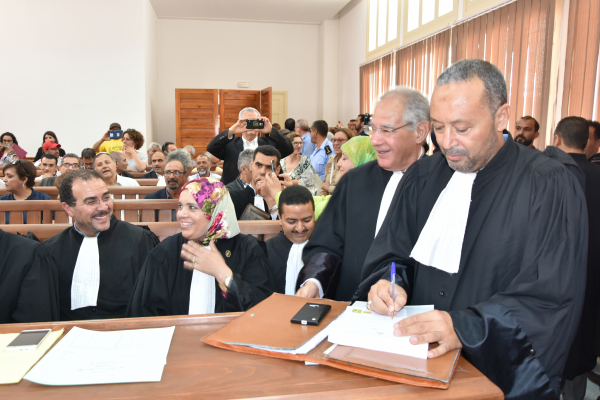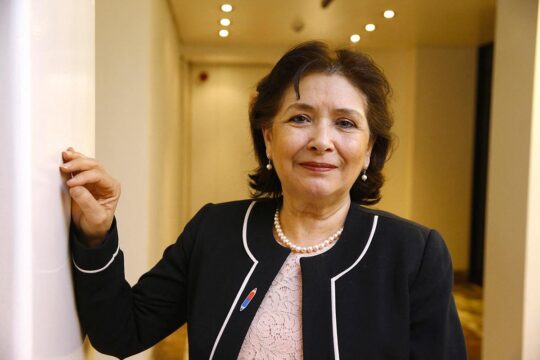On May 29 this year, the trial of Kamel Matmati opened in Tunisia before the specialized criminal chambers charged with trying cases sent to them by the Truth and Dignity Commission. That first trial concerned the forced disappearance and death under torture of this Islamist activist who died in October 1991 of an internal haemorrhage 48 hours after being arrested by police. The hearings raised a lot of hope. Unlike in the past, the presiding judge no longer seemed to be the judicial right arm of the police and government. People felt this might be the beginning of the end of impunity, all the more so because for each hearing measures were taken to protect the identity of the victims, in line with the specialized chambers’ norms. But everyone noticed one thing: the absence of the thirteen accused.
There are 13 specialized chambers. Their mandate is to bring to justice the suspected perpetrators of human rights violations committed between July 1955 and December 2013, as provided by the Tunisian law on transitional justice. During that first judicial session, nine trials opened at seven courts established in several towns across the country. They are dealing with murder, torture leading to death, forced disappearances, rape and other forms of sexual abuse. The organization Lawyers without Borders (ASF), which has been supporting the transitional justice process in Tunisia since 2012, monitored these first hearings. It has just published its first observer report. But the report notes that like the other cases, the Matmati trial was marred by a major fault, “the absence of warrants to bring the accused, even though some are in the country”.
Top officials implicated
Halim Meddeb of ASF says the trials are similar in that “the victims are motivated and the accused absent, except in two or three cases”. There is also “a mobilized civil society, especially for the Matmati trial, dozens of lawyers for civil parties present, and media coverage lacking, despite the importance of the crimes and the cases,” he says. And ASF bureau chief Antonio Manganella says that “because the accused are absent, the trials so far are more like the public hearings of the Truth and Dignity Commission, with more victim testimonies than anything else.
The Commission received 65,000 complaints from victims. By the end of its mandate on December 31 2018, it has promised to transmit 250 case files to the specialized criminal chambers. They are to deal with emblematic cases that can help shed light on the mechanisms of repression and violations of human dignity organized under the regime of former president Ben Ali (who has been in exile in Saudi Arabia since January 14, 2011). For ASF, these trials represent an important step towards establishing responsibilities and sanctions against the still to be reformed security apparatus. For, as the ASF observers point out, “the accusations target notably ex-presidents of the Republic, ministers, top civil servants, agents and officers of the security forces, judges, lawyers, doctors and so on”.
Solitude of the judges
The ASF report says that given the flight abroad of two accused, bans on leaving the country were issued during the trials on Matmati, Abdouli and that on the martyrs and injured of the revolution. “We are still waiting for the judges to take their courage in both hands and issue warrants against the accused,” says Antonio Manganella. “But we have the impression that, thanks to a lack of political will to see the transitional justice process through, the judges are alone without the support of State institutions.”
For the hearings that are now due to resume, most of the specialized chambers have again decided to call the accused and witnesses who have not yet presented themselves. But for many of the suspected perpetrators the current climate favourable to impunity and returning former members of the elite to power encourages them to boycott these courts.
Who wants to punish the judges?
It was the Association of Tunisian Magistrates (AMT) that sounded the alarm. In a press conference on September 5, the association expressed concern about the transfer of almost all the judges of the specialized criminal chambers as part of the 2018-19 judicial plan of the High Council of Magistrates (CSM).
“Many of the judges being transferred by the CSM have not expressed any desire to quit their chambers,” says former AMT president Raoudha Karafi. She regrets that many judges who started working seriously on cases related to serious human rights abuses are now obliged to hand over their work. She also fears that this latest move will also deprive the specialized chambers of their best people and slow down even more the process of dealing with the past.
Indeed, hearings scheduled for the days and months ahead could well be postponed while the new judges receive specific transitional justice training in accordance with the law. Such delays could work in favour of people in power since 2014, recruited mainly from the ranks of the old regime. This elite brought to power in the last elections does not hide its opposition to transitional justice and particularly Sihem Bensedrine, president of the Truth and Dignity Commission.
The only chamber that has escaped these judicial staff changes is that of Nabeul, which will on September 21 start the second hearing in the trial related to Chammakhi, an Islamic activist tortured to death under the Ben Ali regime.






